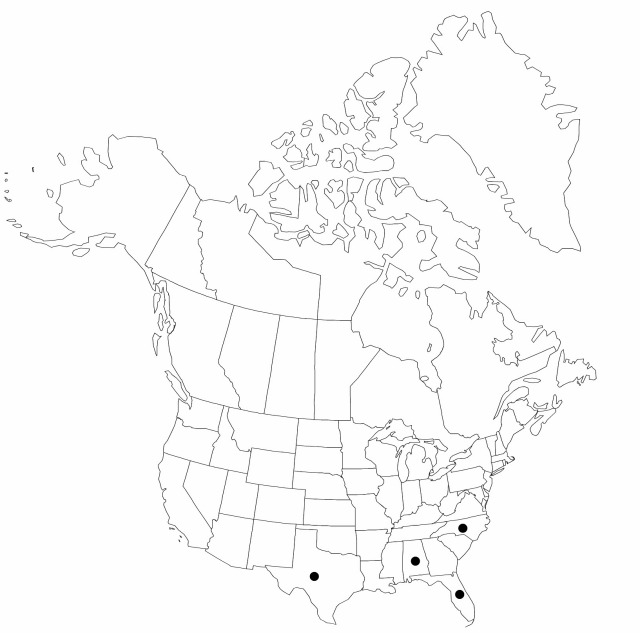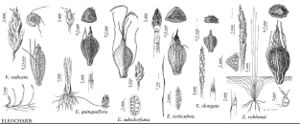Difference between revisions of "Eleocharis elongata"
Fl. South. U.S., 515. 1860.
FNA>Volume Importer |
FNA>Volume Importer |
Revision as of 21:06, 16 December 2019
Plants perennial; rhizomes 1–1.5 mm thick, soft, longer internodes 2–3 cm, scales 5–14 mm, tubers absent. Culms obscurely trigonous to terete; spikelet-bearing culms 16–80 cm × 0.5–1.5 mm; when submersed plants often forming numerous, filiform flaccid culms without spikelets, sometimes with whorls of slender branches, 0.1–0.3 mm wide, soft; sometimes septate-nodulose when aquatic, internally spongy, transverse septa incomplete. Leaves: distal leaf sheaths persistent or decaying, membranous, apex acute, often prolonged into translucent portion to 1 mm. Spikelets not proliferous, (6–)9–24 × 1.4–2.2 mm; rachilla joints bearing prominent winglike remnants of floral scales; proximal scale with a flower, amplexicaulous, 2.5–4.1 mm; floral scales 7–26, 1–2 per mm of rachilla, green to stramineous or pale brown, often minutely dotted reddish, usually with conspicuous dark brown to blackish submarginal band, narrowly ovate, 3.5–4.5 × 2 mm, thickly papery, membranous toward margins. Flowers: perianth bristles 6–7, whitish to stramineous or pale reddish brown, proximally slightly flattened, unequal, exceeding or rarely shorter than achene, 0.7–1.9 mm, retrorsely spinulose; anthers yellow to reddish, 1.7–1.9 mm; styles 3-fid. Achenes whitish, stramineous, or pale green, obovoid to obpyriform, compressed trigonous with adaxial face broadest, or biconvex, 0.65–1.4 × 0.5–0.8 mm, clearly sculptured at 10–15X, each face with 10–13 rows of rectangular, transversely elongated cells, apex constricted to short neck 0.2–0.25(–0.3) mm wide, wider at tubercle base. Tubercles dark brown, pyramidal, 0.2–0.5 × 0.2–0.4 mm.
Phenology: Fruiting late spring–late fall.
Habitat: Sometimes drying ponds, lakeshores, marshes, creeks, canals, ditches
Elevation: 10–50 m
Distribution

Ala., Fla., N.C., Tex., Mexico, Central America, South America.
Discussion
Eleocharis elongata sometimes grows with E. robbinsii; no intermediates are known.
Selected References
None.
